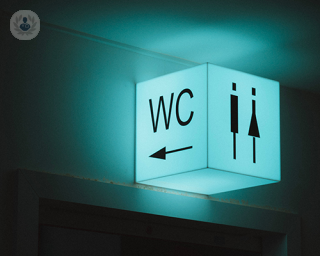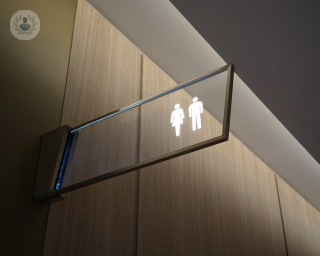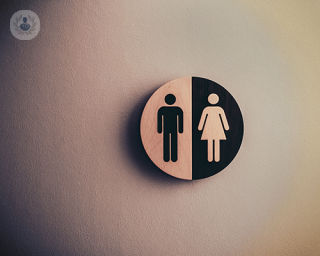What is stress incontinence?
Stress incontinence is when urine leaks out at times when your bladder is under physical pressure for example if you laugh or cough, run, sneeze or lift something heavy. Stress incontinence occurs is much more common in women than in men.
The condition can impact your mental health, you may at times feel embarrassed, isolate yourself, or limit your social and work life, especially leisure and exercise activities.
What are the causes of urinary incontinence?
It’s usually the result of either damage to the muscles such as the urethral sphincter or pelvic floor muscles used to prevent urination or the weakening of them.
The bladder expands as it fills with urine. Usually, valve-like muscles in the urethra stay closed as the bladder expands. It prevents urine leakage until you reach a toilet.
However, if these muscles weaken, anything that adds pressure on the pelvic and abdominal muscles can cause pressure on your bladder and cause you to leak urine.
Factors that can increase the risk of developing stress incontinence can include the weakening of muscles. If you’re obese or overweight, the excess weight can increase pressure on the abdominal and pelvic organs.
Prostate surgery is one of the most common causes of stress incontinence in men. When the prostate gland is removed (prostatectomy) to treat prostate cancer this may result in a weakened sphincter.
In women, childbirth can weaken the pelvic floor muscles or the sphincter can weaken because of nerve or tissue damage during the delivery of a child. Stress incontinence from this can occur years later or soon after the birth of the child. Hysterectomies can also cause stress incontinence. Some connective tissue disorders (for example Ehlers Danlos syndrome) and neurological conditions that affect the spinal cord and brain can also cause urinary incontinence.
How can stress incontinence be treated?
Strategies
There are a variety of treatment strategies to end or reduce the number of incontinence episodes.
- Pelvic floor muscle exercises – These movements can strengthen your pelvic floor muscles and urinary sphincter.
- Changes to lifestyle – Losing excess weight, treating a chronic cough and quitting smoking, for example, can lessen episodes of stress incontinence
- Training your bladder – Scheduling times to empty your bladder can reduce the severity or number of incontinence episodes.
- Fluid consumption – You may be recommended a certain amount and be given times when you’re allowed to.
- Medication – If you’re unsuitable for surgery or want to avoid having an operation, you may benefit from a medication called duloxetine.
- Devices – Certain devices designed for women may help control stress incontinence
Various surgeries can be carried out to treat stress incontinence, these include colposuspension, sling surgery and vaginal mesh surgery.
Other options can include Urethral bulking agents for women which increases the size of the urethra so it stays closed with more force. An artificial urinary sphincter can also help relieve incontinence.
11-12-2019Stress incontinence
What is stress incontinence?
Stress incontinence is when urine leaks out at times when your bladder is under physical pressure for example if you laugh or cough, run, sneeze or lift something heavy. Stress incontinence occurs is much more common in women than in men.
The condition can impact your mental health, you may at times feel embarrassed, isolate yourself, or limit your social and work life, especially leisure and exercise activities.
What are the causes of urinary incontinence?
It’s usually the result of either damage to the muscles such as the urethral sphincter or pelvic floor muscles used to prevent urination or the weakening of them.
The bladder expands as it fills with urine. Usually, valve-like muscles in the urethra stay closed as the bladder expands. It prevents urine leakage until you reach a toilet.
However, if these muscles weaken, anything that adds pressure on the pelvic and abdominal muscles can cause pressure on your bladder and cause you to leak urine.
Factors that can increase the risk of developing stress incontinence can include the weakening of muscles. If you’re obese or overweight, the excess weight can increase pressure on the abdominal and pelvic organs.
Prostate surgery is one of the most common causes of stress incontinence in men. When the prostate gland is removed (prostatectomy) to treat prostate cancer this may result in a weakened sphincter.
In women, childbirth can weaken the pelvic floor muscles or the sphincter can weaken because of nerve or tissue damage during the delivery of a child. Stress incontinence from this can occur years later or soon after the birth of the child. Hysterectomies can also cause stress incontinence. Some connective tissue disorders (for example Ehlers Danlos syndrome) and neurological conditions that affect the spinal cord and brain can also cause urinary incontinence.
How can stress incontinence be treated?
Strategies
There are a variety of treatment strategies to end or reduce the number of incontinence episodes.
- Pelvic floor muscle exercises – These movements can strengthen your pelvic floor muscles and urinary sphincter.
- Changes to lifestyle – Losing excess weight, treating a chronic cough and quitting smoking, for example, can lessen episodes of stress incontinence
- Training your bladder – Scheduling times to empty your bladder can reduce the severity or number of incontinence episodes.
- Fluid consumption – You may be recommended a certain amount and be given times when you’re allowed to.
- Medication – If you’re unsuitable for surgery or want to avoid having an operation, you may benefit from a medication called duloxetine.
- Devices – Certain devices designed for women may help control stress incontinence
Various surgeries can be carried out to treat stress incontinence, these include colposuspension, sling surgery and vaginal mesh surgery.
Other options can include Urethral bulking agents for women which increases the size of the urethra so it stays closed with more force. An artificial urinary sphincter can also help relieve incontinence.


Urinary incontinence in men and women: What are the causes?
Por Mr Rajesh Kavia
2024-12-30
In this informative article, highly respected consultant urological surgeon Mr Rajesh Kavia shares his expert insight on urinary incontinence in both men and women. Ver más


Artificial urinary sphincter surgery for the relief of urinary incontinence
Por Mr Rowland Rees
2024-12-30
Urinary incontinence refers to the involuntary passage of urine, a common problem that affects up to 3 million people in the UK. If you suffer from severe urinary incontinence, however, the implantation of an artificial urinary sphincter can help to resolve symptoms and improve quality of life. Here, Mr Rowland Rees, renowned consultant urologist and male genito-urethral surgeon, provides an expert insight into artificial urinary sphincter surgery. Ver más


Stress incontinence of urine
Por Ms Charlotte Chaliha
2024-12-30
Stress urinary incontinence is a common and distressing symptom that affects 25-45% of women. Risk factors include previous pregnancy, vaginal delivery, obesity, and postmenopausal status. Obstetrician and urogynaecologist in London, Ms Charlotte Chaliha talks about how to stop stress incontinence and who is more at risk. Ver más


Overactive bladder in women: ask an expert
Por Mr Arvind Vashisht
2024-12-27
An overactive bladder is a relatively common condition. How do we define an overactive bladder? What causes it and how can it be treated. Leading gynaecologist Mr Arvind Vashisht explains all you need to know. Ver más
Doctores expertos en Stress incontinence
-
Mr Azar Khunda
Ginecología y ObstetriciaExperto en:
- Stress incontinence
- Uroginecología
- Infección del tracto urinario
- Prolapso genital
- Vejiga hiperactiva
- Problemas de la vejiga
-
Miss Nadia Rahman
Ginecología y ObstetriciaExperto en:
- Enfermedad del suelo pélvico
- Prolapso genital
- Stress incontinence
- Infección del tracto urinario
- Problemas de la vejiga
-
Dr Aneta Obloza
Ginecología y ObstetriciaExperto en:
- Uroginecología
- Prolapso genital
- Stress incontinence
- Incontinencia urinaria
- Problemas de la vejiga
- Cistitis
-
Mr Rajagopalan Sriram
UrologíaExperto en:
- Cáncer de vejiga
- Stress incontinence
- Sangre en la orina (Hematuria)
- Infección del tracto urinario
- Vasectomía
- Vasovasostomía
-
Mr Nicholas Faure Walker
UrologíaExperto en:
- Hipertrofia benigna de próstata
- Vejiga hiperactiva
- Incontinencia urinaria en mujeres
- Infección del tracto urinario
- Stress incontinence
- Prostata
- Ver todos

HCA UK at The Shard
HCA UK at The Shard
32 St Thomas Street, SE1 9BS
No existe teléfono en el centro.
Si haces uso de este teléfono facilitado por TOP DOCTORS nos autorizas al tratamiento de tu teléfono para fines estadísticos y comerciales. Para más información, lee nuestra Política de Privacidad
Top Doctors

Westminster Gynaecology
Westminster Gynaecology
Westminster Consulting Rooms, Guys and St Thomas’ Hospital, Westminster Bridge Rd
No existe teléfono en el centro.
Si haces uso de este teléfono facilitado por TOP DOCTORS nos autorizas al tratamiento de tu teléfono para fines estadísticos y comerciales. Para más información, lee nuestra Política de Privacidad
Top Doctors

Guy’s and St Thomas’ Private Healthcare
Guy’s and St Thomas’ Private Healthcare
Guy’s Hospital, Great Maze Pond
No existe teléfono en el centro.
Si haces uso de este teléfono facilitado por TOP DOCTORS nos autorizas al tratamiento de tu teléfono para fines estadísticos y comerciales. Para más información, lee nuestra Política de Privacidad
Top Doctors
-
HCA UK at The Shard
32 St Thomas Street, SE1 9BS, Central LondonExperto en:
- Angiología y Cirugía vascular
- Cáncer de cabeza y cuello
- Cáncer de mama
- Cirugía ortopédica
- Cirugía Torácica
- Clínica de detección de cáncer
-
Westminster Gynaecology
Westminster Consulting Rooms, Guys and St Thomas’ Hospital, Westminster Bridge Rd, Central LondonExperto en:
- Clínica de detección de cáncer
- Endometriosis
- Fibromas
- Ginecología y Obstetricia
- Incontinencia urinaria
- Menopausia
-
Guy’s and St Thomas’ Private Healthcare
Guy’s Hospital, Great Maze Pond, SE1 South Bank LondonExperto en:
- Alergología
- Cardiología
- Cirugía General
- Cirugía maxilofacial
- Cirugía Torácica
- Cuidado de maternidad
- Ver todos







